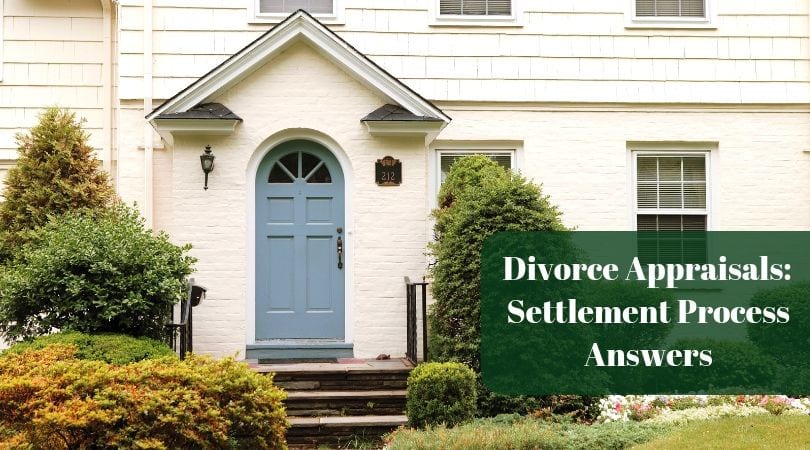Even in the best-case scenario, divorce is a difficult and emotional time for any couple. Besides child custody, deciding the fate of the family home is often one of the major issues and sources of conflict. Not only is there an emotional attachment to the family home, but it is usually the most significant shared asset and the result of years of financial investment for both parties. As a result, most state courts require a recent appraisal as part of the divorce property settlement to establish the value of the property.
What is the process for a divorce appraisal?
Even in the rare event that the spouses agree on the value of the family home, a judge will most likely demand a licensed real estate appraiser to determine its fair market value. Who picks the appraiser for a divorce appraisal varies from one situation to another. The judge may appoint a specific appraiser or leave the choice to the spouses. If this is the case, the attorney or mediator may be able to direct the parties toward a trusted appraisal firm with local experience in Massachusetts.
Divorces are expensive, which raises the question of who pays for the appraisal. The best-case scenario is for the spouses to split the cost; however, in some contested divorce cases, each party may opt for his or her own appraiser.
The appraiser is a third-party that can offer an unbiased opinion of value. To determine the value of the house in a divorce, he or she will inspect the property and take pictures and measurements. The appraiser will observe the features of the property (number of bedrooms, bathrooms, square footage, etc.) as well as its condition. He or she will then compare the house with at least three comparable properties that sold within six months in the same neighborhood and adjust the value according to any differences. After comparison, the appraiser will produce a report justifying the value he or she estimates for the home.
The effective date of divorce appraisals is not always the date of the property inspection (as is the case in most appraisal scenarios), but rather the value of the property at the time of the couple’s separation, at the date of the marriage, or at any other significant milestone. These appraisals are sometimes referred to as historical or retroactive appraisals.
What will the divorce appraisal be used for?
“Who gets the house?” is often one of the first questions people will ask when hearing about a divorce. In most scenarios, especially if children are involved, one person stays in the family home and must ‘buyout’ the person who moves out, often by refinancing the house or taking on a new mortgage loan. In Massachusetts, like in most other New England states, any property acquired after the marriage must be divided in an equitable (fair, but not equal) way. If one of the spouses invested significantly more than the other in the upkeep or toward the mortgage, he or she may (for example) be awarded a larger share.
An unbiased appraisal helps avoid some issues, such as the person staying in the home deflating the value of the house while the one moving out exaggerates it. Since real estate agents are not typically involved in buyout situations, a divorce appraisal is the best way to establish the fair market value of the property.
However, in some cases, keeping the house may not be a possibility. If neither party is financially capable of assuming the new mortgage independently, or if they cannot agree on who will stay in the house, selling it may be the best way to settle the conflict. A divorce appraisal will help determine what is the best listing price for the property and avoid potential conflicts.
Common Appraisal Conflicts in a Complex Divorce Proceeding
Although a fair divorce appraisal may help solve many of the issues that often appear during a divorce, some disputes may still arise.
In some cases, the parties cannot agree on the value of the house. And since an appraisal is an educated opinion, the value of the property may differ from one report to the next. In that scenario, the best way to proceed is for each party to order a different appraisal. The judge or mediator will then decide which report is closest to the fair market value of the property or reconcile the value, depending on the results obtained by each appraiser.
Other times, the divorce appraisal may come in lower than either party would like. In a declining market, for instance, the couple may owe more than the house is worth. If this is the case, the spouses will have to agree on the best course of action either by contributing to necessary repairs or agreeing to split the loss.
Proceeding Confidently
Hiring an appraiser as part of a divorce procedure will help sort out many of the issues that will arise even in the most amicable separation. A divorce appraisal is a delicate part of the divorce property settlement. An experienced appraiser can help facilitate the procedure by offering an objective opinion of value and treating all parties with respect. By choosing an appraiser familiar with common divorce issues—such as timelines and implications of the divorce appraisal—you put all the odds on your side to make the process as smooth as possible.





Thanks a ton for this particular piece of writing. I will talk about it with people I know.
Wow, superb blog format! How long have you ever been running a blog for? you make running a blog glance easy. The whole look of your site is magnificent, as well as the content material!
Fantastic article, I have bookmarked this excellent website and may learn more later. keep up the great work!